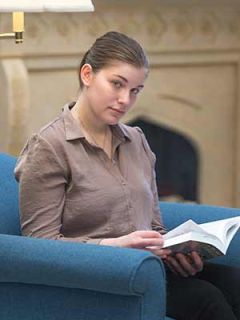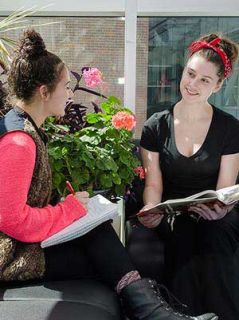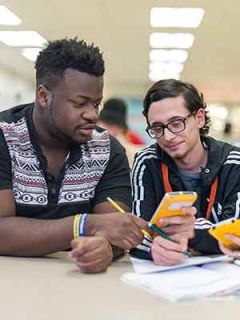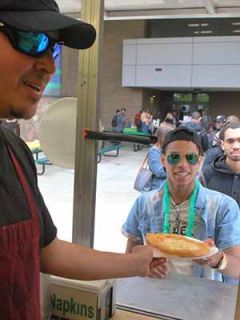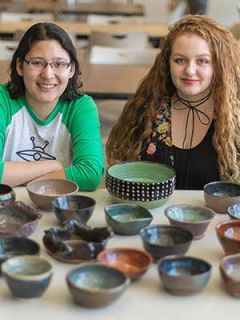The Center for Early Childhood Education at NVCC
A Reggio Emilia-inspired preschool focused on the arts and discovery-based learning
- Home
- Student Resources
- Academic Support Resources
- The Center for Early Childhood Education at NVCC
The Center for Early Childhood Education at NVCC Provides:
- A high-quality school for children 18 months to Kindergarten age
- Child-focused, family-inclusive practices
- Highly-qualified and trained teachers and staff
- Discovery-based learning
- Emergent curriculum embedded with state developmental standards
- Holistic education and assessment
- Competitive tuition rates
- High quality materials and environments for young children
- High adult to child ratios

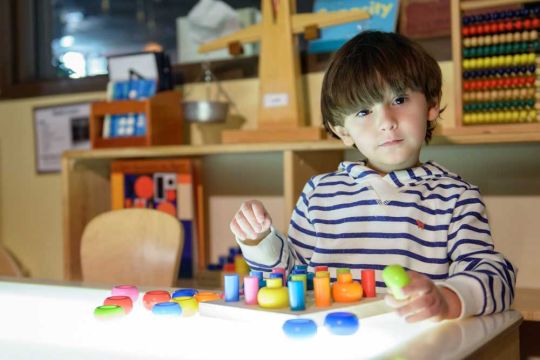
Abbie M Calo
Information & Resources For:
About the Center for Early Childhood Education at NVCC:
A high quality school for young children and teacher training facility since 1977, the Center for Early Childhood Education at NVCC is a state-of-the-art early care and education facility guided by the Reggio Emilia Approach philosophy.
The Center is a place where children and teachers co-construct learning in a hands-on, arts-based and nature-inspired classroom. Considered the third teacher, the environment is intentionally arranged to maximize children's curiosity and creativity in a home-like and developmentally appropriate setting. Collaborative learning also fosters independence, higher-level thinking skills, social competence, language development, and self-regulation, consistently building on skills which prepare children for academic success throughout the school years.
The curriculum emerges from the interests of the children with purposeful and reflective interactions which are expressed by children through exploration, self-expression, and interaction with their teachers and peers, while maintaining an alignment of the State of Connecticut Early Learning and Development Standards as the foundation of the curriculum. Holistic assessment is based on the variety of ways that children represent their understanding and questions, also known as The Hundred Languages of Children.
The use of the Project Approach allows children to explore all domains of learning in the context of in-depth exploration of a topic, inspired by the children's interests and group and individual needs.
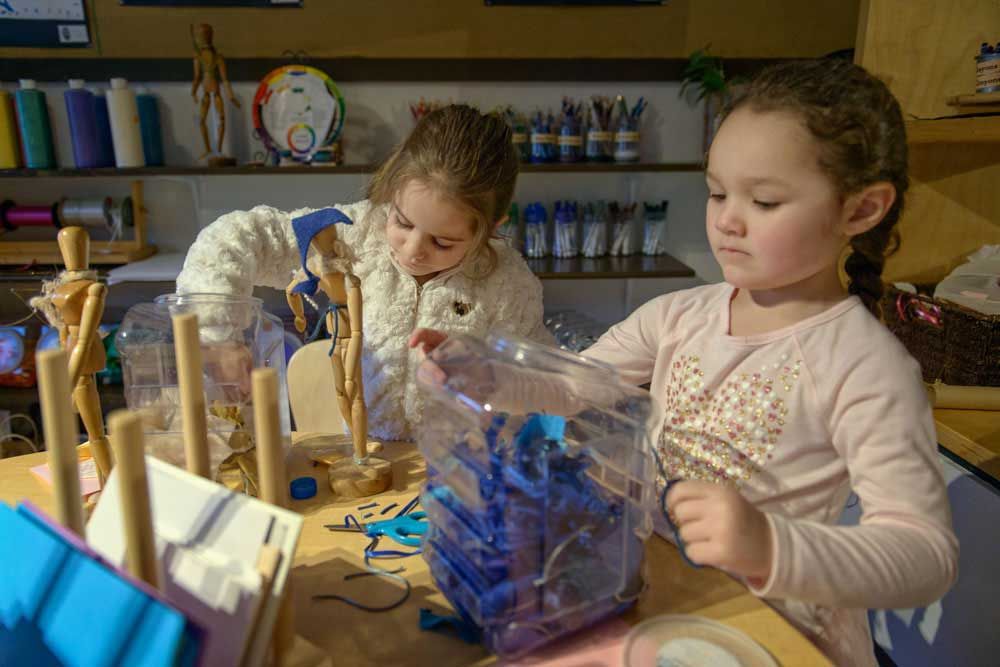
Learn About Our Classrooms
The Sensory Room has 8 children per day who are 18 months - 3 years of age. The classroom is open Monday-Thursday from 7:30 am - 4 pm and Fridays from 7:30 am - 12pm. This classroom follows the college schedule.
Teachers
Wilissa Clark
Emilie Cole
Download Sensory Classroom M-Th Schedule
Download Sensory Classroom Fri. Schedule
Focus of Classroom
We are looking forward to the new year and to seeing what adventures your children's interests take us on this year!
Assessment Portfolios
The teachers will complete assessments 2-3 times per year based on state guidelines and the Connecticut Early Learning and Development Standards. Individual portfolios are created for each child that include teacher observations, individual child goals, photos and child work. This provides a holistic look at each child's individual development, strengths and needs.
Conferences will be held 2 times per year and at other times if needed. Parents are encouraged to discuss their child's activities on a daily basis and to make an appointment if they have any concerns.
The Discovery Room is a preschool classroom serving 20 children, aged 3 - 5, daily.
Teachers
Luz-Nelly Torres
Download Discovery Room Schedule
Focus of classroom
We are looking forward to the new year and to seeing what adventures your children's interests take us on this year!
Assessment portfolios and screening
Academic screening will be completed for each child in the fall. Using this and teacher observations, individual goals and a portfolio for each child will be prepared.
The teachers will complete assessments 3 times per year based on state guidelines and the Connecticut Early Learning and Development Standards. Testing and evaluation is also available through the Waterbury Public School system, if necessary.
Conferences will be held 2 times during the year and at other times if needed. Parents are encouraged to discuss their child's activities on a daily basis and to make an appointment if they have any concerns.
The Exploration Room accommodates 20 children daily, 16 preschool and 4 kindergarten aged.
Teachers
Luz-Nelly Torres
Download Exploration Room Daily Schedule
Focus of classroom
We are looking forward to the new year and to seeing what adventures your children's interests take us on this year!
Assessment portfolios and screening
Academic screening will be completed for each child in the fall. Using this and teacher observations, individual goals and a portfolio for each child will be prepared.
The teachers will complete assessments 3 times per year based on state guidelines and the Connecticut Early Learning and Development Standards.Testing and evaluation is also available through the Waterbury Public School system, if necessary.
Conferences will be held 2 times during the year and at other times if needed. Parents are encouraged to discuss their child's activities on a daily basis and to make an appointment if they have any concerns.
The Kindergarten of Reflection program runs on a needs basis and is limited to approximately 4 children. Students participate in some activities in the Exploration Room including project time, art, music, stories and free play. They also meet in small groups for reading, writing, math and other kindergarten activities. A certified kindergarten teacher coordinates this program Monday - Friday, in collaboration with the preschool teachers.
Teachers
Classroom daily schedule
Focus of classroom
The Kindergarten of Reflection is a kindergarten program that includes a combination of child-directed and direct-instruction teaching methods.
Assessment portfolios and screening
Assessments are based on State of Connecticut standards for Kindergarten aged children.
Children are assessed throughout the year and recorded during two cycles. Conferences for parents are held at the end of each cycle. Children who attend our Kindergarten must be 5 years of age by January 1st in order to attend first grade the following year.
The Marianne Generali Grand Atelier is a community atelier or art studio. In other words, the room is solely devoted to the arts and the projects that the children engage in throughout the year.
Teachers
Philosophy of Art
Art activities are planned daily at the Center. Art done by young children often does not “look” like anything in particular. It is a process. Exploration of creative materials such as paint, clay, scraps of paper and yarn and a manipulation of these materials, is important.
Why creative art?
There are many reasons for doing creative art activities. Among these are muscle development, emotional release, aesthetic appreciation, perceptual awareness and cognitive growth. Also, your children learn independence and to make choices by choosing their own expressions of art. They also develop good work skills by cleaning their areas later.
Children who engage in creative art develop a longer attention span and a greater ability to finish tasks. The art activities done in our program do not involve patterns, cutouts or coloring books. This type of experience stifles creativity and does not provide a positive experience for the child. Children become more concerned with whether their “art” project looks like everybody else’s rather than how much they are experiencing the material or expressing themselves. A creative expression can help your child realize that he/she is a worthwhile person that has good ideas and that there is more than one way to do things. Though the process is often more important than the product, your child will be proud of their artwork.
What is it? How to encourage your child's creative activity...
When your child plays with art, he/she is creating both emotionally and intellectually. Their work comes from their deepest feelings and deserves praise and encouragement. Try to avoid comments like, “What is it?” or “Which end is up?” (even though, the picture may be a puzzlement). Comments like, “I see many colors in your painting” are positive comments which increase the creative level of your child as well as helping your child develop good feelings about his/herself.
School Readiness
The Center for Early Childhood Education has had a Waterbury School Readiness component since 1998. School Readiness is a state-funded initiative from the Connecticut Department of Education and the Department of Social Services that was established by the legislature in 1997 to provide spaces in accredited programs for eligible children.
Eligible children must be three or four years old and live in Waterbury. Children are eligible for either our full-day/full-year program or our part-day/part-year program. Parents fees are based on the DSS school readiness sliding fee scale.
Contact us for more information.
Current Family Information
Families as Partners
Parent and family involvement is integral to the Reggio Emilia Approach. The Center highly values parent and family involvement in the school lives of your child(ren). If there is anything you would like to share with your child’s classroom, i.e. a cultural or family tradition or recipe, please contact one of the head teachers of your child’s classroom to set up a time.
There are many avenues that families can participate in at the Center, including:
- visiting the classroom to share talents and skills or to share family culture
- participating on field trips
- contributing to holidays, celebrations or special events
- dropping in to visit or read to the children
- participating in ongoing projects
Family Council
Role
As partners in your child(ren)'s education we honor you as members of our Family Council! The Center Family Council meets four times per year. As a member of the council, your role would be to review policies, participate in hiring and be an overall support to the Center.
Policy
The council will consist of:
- parents from the Sensory Room
- parents from the Exploration Room
- parents from the Discovery Room
- parents from the Kindergarten of Exploration
- staff of the Center for Early Childhood Education & Early Childhood Education Department
The council will meet four times per year and additionally as needed.
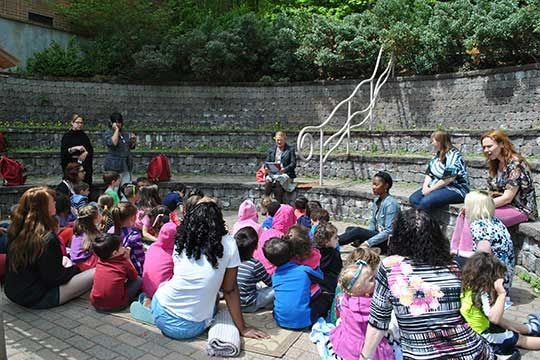
Fundraisers
Fundraisers to Help Meet Our Goals:
Scholastic Book Fair (for Scholastic credits for books)
Delisheries All Natural Mixes
Flower Power
Bake Sale
The Student Teacher Experience
In addition to providing high quality care and early childhood education, another important component of the Center for Early Childhood Education is the student teaching experience.
Learn about Naugatuck Valley Community College's Early Childhood Education A.S. degree and the student teacher practicums in the Center for Early Childhood Education.
Community and Professional Development
Tours
Early Childhood Education professionals and other community members can schedule a tour for themselves and staff at the Center for Early Childhood Education.
Professional Development
- Children's Exploration in the Early Childhood Classroom Using the Project Approach
- Early Childhood Conference: The Ideal Early Learning Experience: What Does It Look Like? featuring keynote speaker and writer of Creative Curriculum, Diane Trister Dodge
- Experiences, Materials, and Documentation: Authentic and Creative Practice

